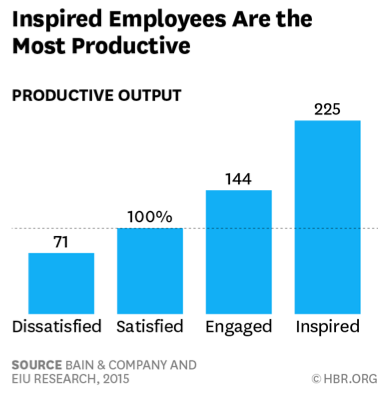Blog
What Data Tells The Productivity Story?
January 18, 2016
Posted by: Mitch Ballard
I was recently reading an article that talked about how technology has made businesses more productive. Of course I agreed.
Then I read on, and the article addressed other issues that drive business productivity more than just technology. While few would disagree that technology has certainly enhanced productivity in many manufacturing sectors, there is still and always will be the human element that affects productivity in all business sectors. As I read on, I found the findings of recent research from Bain & Company, conducted in conjunction with the Economist Intelligence Unit, revealing and I wanted to share some of the findings with our readers. Fundamentally employee satisfaction, scaled at different levels of “satisfaction”, drives productivity. Productivity drives customer satisfaction which drives revenue as well as profitability. So the story revealed by your productivity data leads to profitability if you focus on the issues that drive it. Keep reading.
From the report starts with: The foundational elements—call them employee satisfaction—are fundamentals such as having a safe work environment and the tools necessary to do the job. Abraham Maslow taught us that we can’t concern ourselves with higher goals until we have the necessities of life, including security. So it is in the workplace: first things first.
Next come the elements of true engagement, such as the feeling that you’re part of an extraordinary team, that you’re learning and growing, and that you can make a real impact. And then, at the top—perhaps the equivalent of Maslow’s self-actualization—is the feeling that you derive meaning and purpose from the company’s mission. That’s inspiration.
Most of us know how important inspiration can be in everyday life. In the workplace, as one pundit put it, employees react differently when they encounter a wall. Satisfied employees hold a meeting to discuss what to do about walls. Engaged employees begin looking around for ladders to scale the wall. Inspired employees break right through it.

What can companies do to increase satisfaction, engagement, and ultimately inspiration? Most organizations go about things in the wrong way.
Managers often decide that the real issue for employees is how much money they make. Pay people more, the story usually goes, and they’ll do anything you ask. So the company overinvests in the economic rewards for the job. Ironically, this can have the effect of lessening engagement by turning everything into a quid pro quo. Most employees are not coin-operated, and more money does not lead to more engagement.
At the same time, many companies underinvest in some of the other foundational elements. Take the statement “I can get my job done efficiently, without excess bureaucracy.” How many people in your organization would agree with it? If people are constantly struggling with unnecessary meetings, ridiculous approval processes, and work obstacles, they are unlikely to be satisfied, let alone engaged or inspired. These ways of working, which determine where we work, how we work, and with whom we work, are as important in defining our workplace experience as the formal business processes that define the work’s content. It’s much the same with the statement, “I have autonomy to do my job.” Low spans of managerial control often lead supervisors to micromanage their teams. The work itself is often routinized to the point where people have no chance to exercise their own judgment or creativity.
So the bottom line is that most of us, include our own company, either collect the wrong data and think we’re doing fine or we don’t collect any data and have no idea how productive we really are. How about you? Maybe we should build an app to help ourselves and our customer measure the right things that drive productivity. Based on the recent research that data needs to be employee centric to different levels of satisfaction. I just wonder how many companies would actual want to know.
